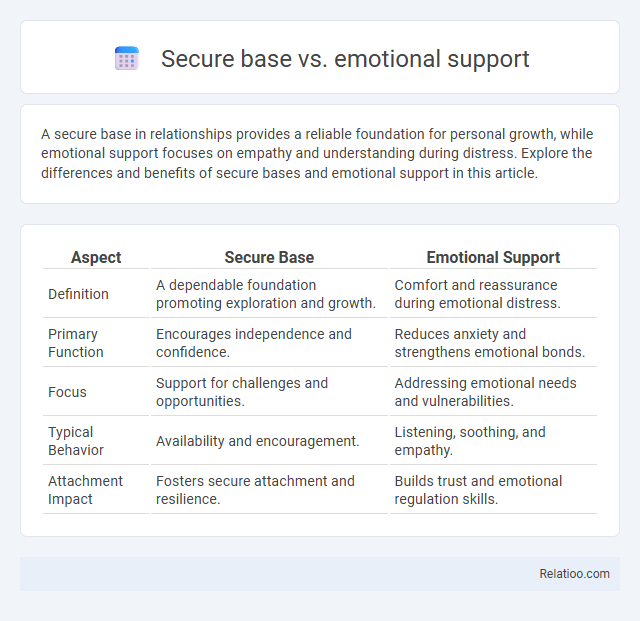A secure base in relationships provides a reliable foundation for personal growth, while emotional support focuses on empathy and understanding during distress. Explore the differences and benefits of secure bases and emotional support in this article.
Table of Comparison
| Aspect | Secure Base | Emotional Support |
|---|---|---|
| Definition | A dependable foundation promoting exploration and growth. | Comfort and reassurance during emotional distress. |
| Primary Function | Encourages independence and confidence. | Reduces anxiety and strengthens emotional bonds. |
| Focus | Support for challenges and opportunities. | Addressing emotional needs and vulnerabilities. |
| Typical Behavior | Availability and encouragement. | Listening, soothing, and empathy. |
| Attachment Impact | Fosters secure attachment and resilience. | Builds trust and emotional regulation skills. |
Understanding Secure Base and Emotional Support
Understanding Secure Base involves recognizing a reliable foundation that encourages exploration and growth while providing safety, whereas Emotional Support centers on offering comfort and empathy during times of distress. Your secure base fosters autonomy and confidence, enabling you to take risks and pursue goals with assurance. Emotional support, in contrast, helps regulate emotions and manage stress through validation and reassurance.
Defining Secure Base in Relationships
A Secure Base in relationships refers to a trusted partner who provides safety and confidence, encouraging Your personal growth while remaining emotionally available. Emotional support involves empathy and reassurance during stressful times, fostering emotional well-being but not always promoting independence. Understanding the Secure Base concept is essential for building resilience and secure attachment within healthy relationships.
What Is Emotional Support?
Emotional support involves providing empathy, care, and reassurance during times of stress or emotional distress, helping to enhance Your sense of well-being and resilience. Unlike a secure base, which offers safe exploration and autonomy, emotional support focuses on validating feelings and reducing anxiety in the moment. Both secure base and emotional support are crucial for healthy relationships but serve distinct psychological needs.
Key Differences: Secure Base vs Emotional Support
A secure base provides a foundation of safety that encourages exploration and growth, rooted in consistent availability and trust, while emotional support primarily addresses comfort and reassurance during distress. The secure base emphasizes fostering independence through reliable presence, whereas emotional support centers on immediate empathy and validation. Understanding these distinctions clarifies that secure base functions as a long-term relational scaffolding, contrasting with the situational nature of emotional support.
Psychological Theories Behind Secure Base
Secure base, emotional support, and secure base concepts are rooted in attachment theory, emphasizing how caregivers provide safety and comfort to foster exploration and resilience. The psychological theories behind a secure base highlight its role in creating a reliable foundation from which You can confidently navigate challenges, knowing emotional needs are met. Emotional support complements this by offering empathy and validation, reinforcing a secure attachment that promotes healthy psychological development.
Emotional Support: Components and Importance
Emotional support encompasses empathy, active listening, validation, and reassurance, providing individuals with comfort during times of stress or uncertainty. This form of support enhances psychological well-being by fostering feelings of safety, belonging, and self-worth, which are crucial for resilience and mental health. Unlike the secure base concept, which emphasizes exploration and autonomy, emotional support primarily addresses emotional regulation and connection in moments of vulnerability.
Secure Base in Parenting and Child Development
A secure base in parenting provides children with a reliable foundation of safety and trust, enabling exploration and learning while knowing they can return to parental support. Emotional support involves attuned responses to a child's feelings, fostering emotional regulation and resilience but differs from a secure base by emphasizing empathy over physical security. Establishing a secure base is essential for healthy child development, promoting autonomy and confidence through consistent availability and assurance from caregivers.
Emotional Support in Adult Relationships
Emotional support in adult relationships involves providing empathy, validation, and understanding to help partners manage stress and emotional challenges effectively. Unlike a secure base, which serves as a dependable foundation encouraging exploration and growth, emotional support focuses specifically on nurturing emotional well-being through active listening and compassionate responses. Research highlights that consistent emotional support strengthens relationship satisfaction and fosters resilience against interpersonal conflicts.
How Secure Base and Emotional Support Interact
Secure base provides a foundation of safety allowing you to explore challenges, while emotional support offers reassurance and understanding during stress. Together, secure base enhances resilience by promoting confidence, and emotional support strengthens coping by addressing feelings. Their interaction creates a balanced environment fostering growth and psychological well-being.
Building Both: Strategies for Healthy Connections
Building both a secure base and emotional support strengthens your relationships by fostering trust and reliable comfort during challenges. Effective strategies include consistent communication, active listening, and providing reassurance that encourages autonomy while maintaining closeness. Prioritizing these approaches enhances emotional resilience and deepens connections essential for long-term relationship health.

Infographic: Secure base vs Emotional support
 relatioo.com
relatioo.com